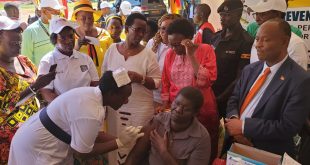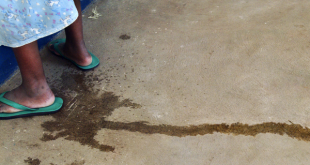Wednesday, 26 October 2022

By Timothy Eodu-Moroto
The permanent Secretary at the Ministry of Health Dr. Diana Atwine and the State Minister for health Hon. Anifa Kawooya Bangirana has today launched the Seasonal Malaria Chemoprevention (SMC) program in Karamoja.
The launch brought together several local leaders from the nine districts of Karamoja, area members of Parliament, Parliamentary Malaria Committee Members, Village Health Teams-VHTs and members of the community.
While speaking during the event, the Moroto Regional Referral Hospital director Dr. Steven Pande said Malaria remains a big challenge in Karamoja region due to its uniqueness with almost 40% of cases being registered at the Out Patient Departments (OPD) in various health facilities across the region.
Dr. Pande attributed this prevalence to poor nutrition, attitude towards access to health care, longer distances of health care facilities in some communities and misuse of mosquito nets which he says could have also worn out by now.
He however was very appreciative that results being registered after the SMC program rolled out are too convincing in that referrals due to severe malaria especially among the target population (Children below 5 years) has over time tremendously reduced.
“Ever since this program begun, we have seen a great reduction in the number of referrals coming into hospitals. This is a great stride in tackling malaria in Karamoja and it should be rolled out to all categories including adults, this will surely improve the situation,” Pande said.
Sagal Maria a mother in Lokuyon Manyatta in Ngoleriet Sub County, Napak where the team had a field visit testified that ever since her kids were enrolled for this treatment-SMC, she has not gone to hospital to seek for any malaria related treatment.
Maria says the Village Health Teams-VHTs have been very supportive to them as they provide timely service in the manyatas especially Lokuyon which is very far away from the nearest health facility.
According to Mario Balla, the VHT Natari village in Ngoleriet Sub County-Napak district, this treatment has reduced malaria prevalence in his area and mothers who could not access emergency health services (especially on Malaria) now rely on him and his other colleagues.
Hon. Faith Nakut the Napak woman member of Parliament thanked the ministry for launching this program in Karamoja and choosing to visit her home Sub County which lacks any health facility to help her people.
She said government should prioritize areas such as Karamoja and other vulnerable communities in the country when it comes to budgeting in line with health services and called for the upgrade of some health facilities in Napak district which has no district hospital, so that better health services can be extended to communities there.
According to Dr. Diana Atwine the Permanent Secretary at the Ministry of Health, limited funds at the Ministry is hampering implementation of most programs in Karamoja and the country as a whole yet the need is over whelming.

Dr. Atwine was however wondering why Karamoja, a land that is always dry with limited surface water breeding too toxic mosquitoes that cause malaria more than other parts of the country with more potential breeding grounds for Mosquitoes.
She called for extensive scientific research by the local stakeholders to ascertain the epidemiological character of Mosquitoes in Karamoja so that they can inform government on better ways to tackle the insect spreading one of the greatest killer disease in Uganda.
The PS challenged the health Ministry technical staffs to rethink on how to handle malaria because the whole country is only relying on the ministry for possible solutions that they can implement to fight malaria.
The State Minister for health in charge General Duties Hon. Anifa Kawooya Bangirana says as government, they have always prioritized the health of the citizens and as such will do it’s level best to ensure that malaria is completely defeated in Uganda just like it did with polio.
The minister was skeptical that only if there will be concerted efforts by all stakeholders, then the elimination of malaria from communities will be history since everyone will have played their role as and when required.
She said as a country, there is a very big need to invest in information gathering, storage and transmission not only at the ministry of health but across all government agencies so that the data will always be available for reference and capacity building for especially front liners like the VHTs who are on the lead in ensuring that malaria is defeated in households.
The Minister also said the fight against malaria in Uganda is being guided by the strategic plan 2021-2025 and things are moving on the right track with the current initiative already starting to register positive results in Karamoja.
She promised that the SMC program will be enrolled to Kaabong district (the only one missing in the project scope) as soon as government realizes some more funds to sustain the program.
Available statistics indicate that between 2017 up to date, approximately 34% (registered cases of malaria in health facilities) Out Patient Departments (OPD) visits had malaria in Karamoja region alone although its feared to had jumped to 40% recently, the national prevalence as per the Ministry of Health is 9%.

On 3 June 2022, the World Health Organization (WHO) issued new malaria chemoprevention guidelines. While previous WHO policy recommendations provided specific guidance on how chemoprevention interventions should be implemented, the new guidelines give more flexibility to malaria-endemic countries to adapt chemoprevention strategies to the local context.
According to Malaria Consortium, the implementing partner in the SMC program in Uganda, these new guidelines are good and believes that a shift towards greater flexibility and an emphasis on local evidence has the potential to significantly boost the fight against malaria. However, there remains a need for globally agreed and accepted frameworks to guide the safe, effective and sustainable deployment of the various chemoprevention tools across the African continent.
This has particular relevance to the issue of drug resistance, which requires a coordinated approach across national borders. There are varying levels of resistance to sulfadoxine and pyrimethamine (SP), the drugs used for seasonal malaria chemoprevention (SMC) and intermittent preventative treatment in pregnancy (IPTp), across the continent and changes to the deployment of any intervention should be considered within a global decision-making framework.



